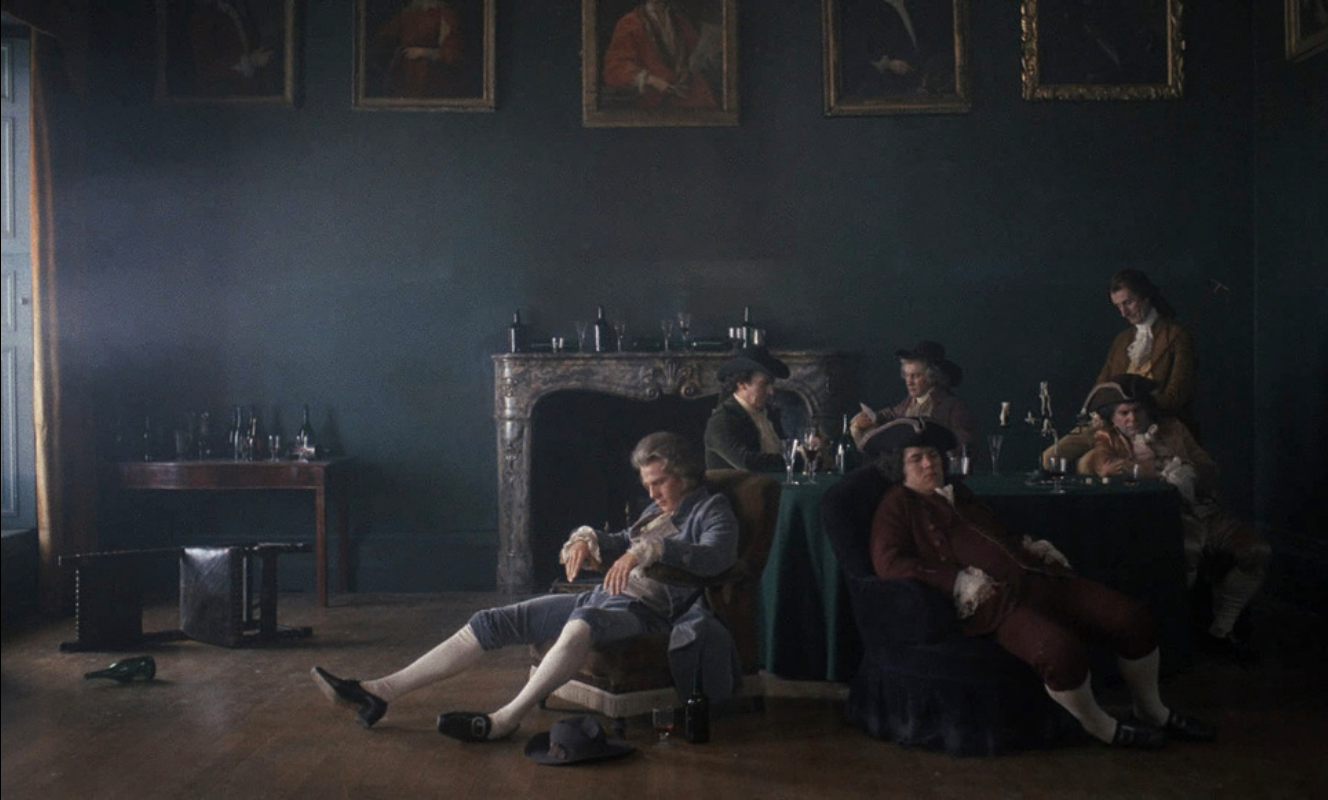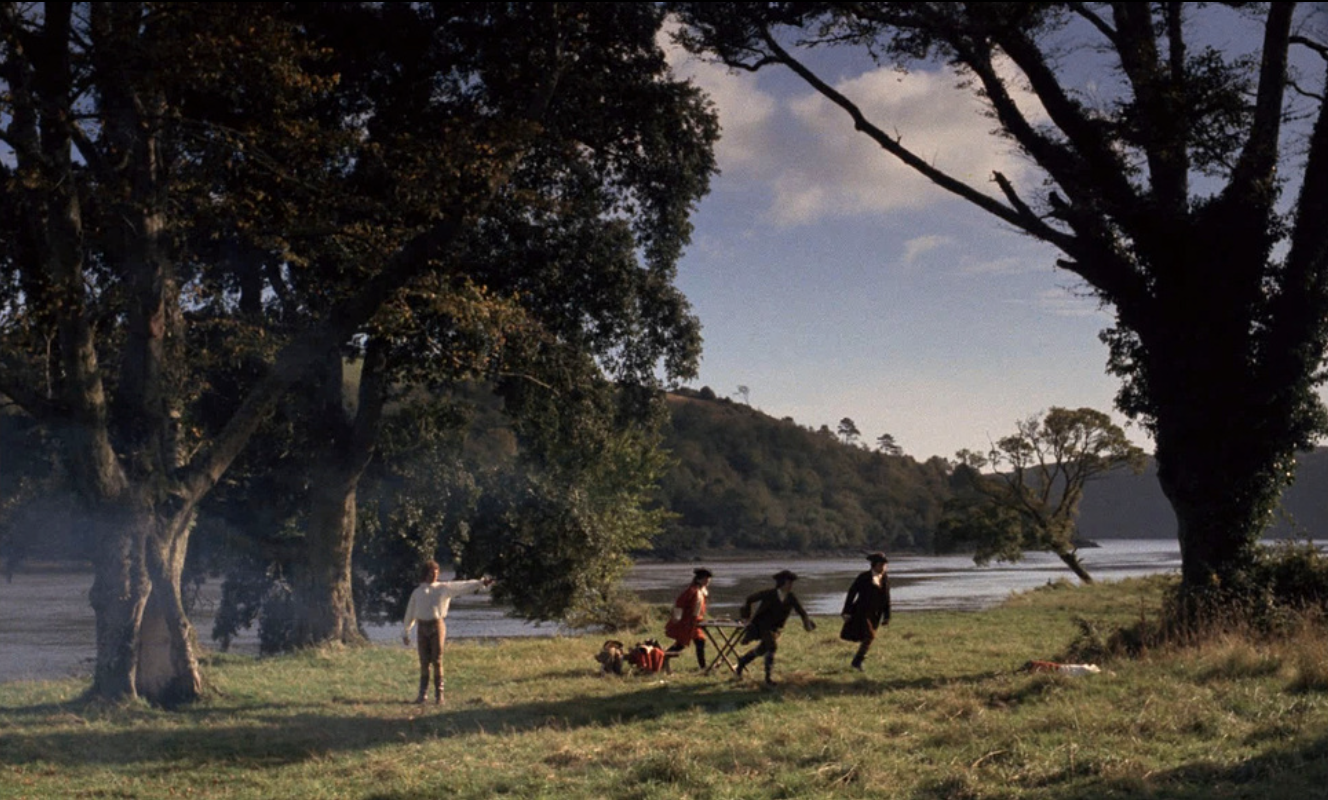The Crosspatch Times 5 - Barry Lyndon and Kubrick’s “Coldness”
Sad Barry with his bros.
Recently, I had the joy of experiencing Stanley Kubrick’s Barry Lyndon for the first time. Should I have seen it years ago? Probably. But we all have a few embarrassing omissions in their movie-watching history and now I have one fewer, so I say, let’s celebrate that.
Background
Barry Lyndon (1975) is the story of an Irishman who cheats and lies his way to the top of English society during the reign of George III. Kubrick famously liked to make a single film in a genre and then never revisit that genre, and Barry is Kubrick’s contribution to the realm of period drama. Similar to when he previously visited film noir (1956’s The Killing), science-fiction (1968’s 2001: A Space Odyssey), and… well, I would consider Paths of Glory (1957) as much a legal thriller as a war film, but either way, Barry Lyndon should be considered one of the very best examples of its kind. The same could be said of the dystopian A Clockwork Orange (1971) and, maybe my personal favorite, Kubrick’s only obvious comedy, Dr. Strangelove (1964). Full disclosure, I have never seen Fear and Desire (1952), Killer’s Kiss (1955), or Full Metal Jacket (1987), but of the movies I have seen, it’s safe to say Kubrick never made a bad film.
A hot take. I know.
No one is really out here saying Kubrick wasn’t an incredibly gifted filmmaker, even if the word “genius” gives you The Ick like it does me. Genius implies a level of otherness to Kubrick or any filmmaker that puts distance between them and the rest of humanity. I think it’s a way of claiming an appreciation for what Kubrick did without actually engaging with the text itself.
When I was in college, Barry Lyndon was often cited as a technical marvel with little else to offer. It was Exhibit A for those who called Kubrick “cold.” We all heard about the candlelit scenes, the custom lenses, the impeccable compositions. But we never heard about Barry himself (Ryan O’Neal) or what actually happened in the movie. It was dismissed as something you could go online and find still frames of and that would basically be of equal value to watching the movie, and it would take about 2 hours and 55 minutes less of your time. As someone who found 2001: A Space Odyssey impenetrable on first viewing, watching Barry do his thing seemed like a poor use of my time.
Now I’m mad I waited so long.
Barry Lyndon is Funny
Nora and Capt. Quin don’t know jealous Barry’s about to ruin their afternoon.
Earlier I called Barry Lyndon a period drama and while that might be the most accurate way to describe it, it’s equally important to describe the movie as hilarious. I’ve always loved Kubrick’s dry sense of humor and how it plays in his objective framing. His compositions aren’t just pretty, they’re purposeful. If a shot in a Kubrick film starts tight and pulls back, you can bet that what we see in the wider shot is going to lend context to the story and give you insight into the characters. Oftentimes, the reveals in such moves are jokes, or they completely recontextualize the conversation you thought the characters were having.
In one example, Kubrick starts in an intimate 2-shot between Barry’s cousin, Nora, (Gay Hamilton) and English Captain, John Quin (Leonard Rossiter) as they profess their love for each other. The shot dollies back to show them standing in an immense field, which is gorgeous, but inhabited by another couple. It’s then revealed Nora’s brothers are standing only a few feet away. The melodrama of the tighter shot plays as ridiculous in the wide, as if to say “Don’t take these people too seriously, they’re not that big of a deal in the long run.”
That’s a big theme in Barry Lyndon: taking things seriously. The inciting incident in the movie is a duel that takes place between Barry and Cpt. Quin, which Barry wins. Later, after he’s fled the town, been robbed, and joined the Army, it’s revealed that the duel was fake: Everyone conspired to make Barry think he won just to get him out of the way so Quin could marry Nora and their family would be entitled to a portion of the captain’s wealth. The most important moment of Barry’s young life is reduced to a little more than a prank.
Barry himself starts out with the name Redmond Barry, switching for a time to “Johnathan Fakenhem” (or, as I like to call him, “Johnny Fakename”) after he flees the Army. He thinks he’s being clever! And sure, it works when he’s talking to a lonely German girl who isn’t familiar with English. But as soon as he tries it on a Prussian soldier, the man is suspicious and eventually arrests him. As is the case with most events in the first half of the movie, Barry lucks into a better position in the end. He never learns his lesson, never thinks of himself as anything other than a smooth criminal, a serious man.
The whole movie is defined by the long slow dolly out: a failure by the man to “pull back” and look at himself objectively. He’s a fool, those who trust him are fools, and the only enemies he ever bests are fools. Barry’s rise and fall are farcical. Kubrick knows this dude is ridiculous and the society that keeps letting him climb its ladder is ridiculous too.
A Note on Ryan O’Neal
Life ain’t easy for ol’ Johnny Fakename.
Is Ryan O’Neal a good actor? Many would say no. One person on Letterboxd called him “the worst actor in the world” for whatever that’s worth. The same person also gave this movie 4 ½ stars.
O’Neal famously disagreed with Kubrick on the direction of the movie, saying Kubrick changed the story in the edit. The story goes that O’Neal thought Barry was the hero and was surprised to find he was the butt of a joke. Literally–the last shot we see of Barry is of his butt as he climbs into a carriage, disgraced.
While Kubrick was, by all accounts, more willing to revise his ideas in the moment than he’s given credit for, I have a hard time believing Kubrick changed his mind about Barry’s character after the film was in the can. What I can believe is that Kubrick let O’Neal think Barry was a hero because that’s what Barry thought he was. O’Neal’s performance reflects a character who is frequently confused and has an inflated opinion of himself. He’s not entirely without redeeming qualities: he values life enough to cry when a friend dies, and he loves his son dearly when he’s born. But mostly, he’s a handsome self-serious ass who succeeds best when he keeps his mouth shut. A hot idiot.
I’m not saying Kubrick hired Ryan O’Neal because he wanted a hot idiot to play a hot idiot. I’m not saying Ryan O’Neal was a hot idiot–there’s plenty to suggest he was a difficult and problematic person, but I’m not here to make that case either.
What I will say is this: he works in the movie because there’s not an ounce of self-awareness in the performance. Ordinarily, I’d credit an actor for that level of fearlessness. However, if this movie was what O’Neal claimed he thought it was, it would’ve totally sucked.
“Coldness”
Barry lying as hard as he can.
For more in-depth commentary on this subject, I suggest the podcast, Blank Check with Griffin and David, who did a really awesome miniseries on Kubrick’s filmography. I’m not the first to say that Kubrick isn’t as cold or alien a “genius” as critics claimed in 1975 when this movie came out.
In many of his movies, Kubrick makes use of a handheld camera, which he himself would operate–as a former documentarian, Kubrick was a master of camerawork, as you might expect of someone with his visual acuity. He uses it in specific circumstances to convey a sense of wildness, often of violence. In Barry Lyndon, the most prominent use of handheld is in a sequence where Barry boxes another member of the British Army. Barry wipes the floor with the man, with Ryan O’Neal making great use of his history as a boxer. You’re right in the fight during this sequence as a viewer, as you are in A Clockwork Orange when Alex DeLarge menaces a woman with a giant sculpture of a penis.
The common thread about Barry’s film is that it’s austere and static, but here is a clear example that says otherwise. It’s not that Kubrick is austere or cold for the sake of it, it’s simply that he chooses the tool he thinks works best for the moment he’s trying to create. He’s always considering, always thinking about the desired effect. In the case of Barry Lyndon and much of Kubrick’s work, I’m drawn to a quote from Tracy Jordan on 30 Rock: “Comedy lives in the wide shot.”
Would I say that Kubrick is an empathetic filmmaker? Maybe not. But he certainly understands emotion and his movies wouldn’t work without them. He didn’t do a million takes just because he wanted to achieve some platonic ideal of perfection; he did it because he wanted to see something that he couldn’t think of on his own. You say ethereal genius? I say stubborn. He hired strange and volatile actors (Timothy Carey, anyone?) because their unpredictability could be felt on screen. They weren’t dummies for him to position anywhere he liked. He was hunting for a feeling, always, even when he was being cynical…which was kind of all the time.
Wrap Up
Barry “wins” a duel.
This is a movie everyone should make time for, and that’s a sentiment I know is growing in recent years. Lots of people have discovered this movie. I think the visual vocabulary to understand and enjoy it is an important tool for anyone living now, in the wake of the 2024 Presidential election, when it’s more vital than ever to call out a buffoonish man failing upwards when we see one. Maybe the movie just needed the cynicism of society to catch up with that of it’s creator. You can look at this movie and see nothing but beautiful landscapes and Renaissance-style artwork in every frame, but if you’re willing to let the movie talk to you in its reserved, idiosyncratic way, you’ll be rewarded.





